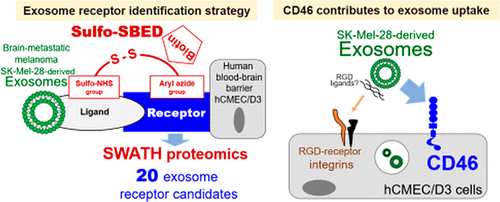当前位置:
X-MOL 学术
›
Mol. Pharmaceutics
›
论文详情
Our official English website, www.x-mol.net, welcomes your
feedback! (Note: you will need to create a separate account there.)
Cluster of Differentiation 46 Is the Major Receptor in Human Blood–Brain Barrier Endothelial Cells for Uptake of Exosomes Derived from Brain-Metastatic Melanoma Cells (SK-Mel-28)
Molecular Pharmaceutics ( IF 4.5 ) Pub Date : 2018-11-19 00:00:00 , DOI: 10.1021/acs.molpharmaceut.8b00985 Hiroki Kuroda 1 , Masanori Tachikawa 1 , Yuta Yagi 1 , Mina Umetsu 1 , Armania Nurdin 1 , Eisuke Miyauchi 1 , Michitoshi Watanabe 1 , Yasuo Uchida 1 , Tetsuya Terasaki 1
Molecular Pharmaceutics ( IF 4.5 ) Pub Date : 2018-11-19 00:00:00 , DOI: 10.1021/acs.molpharmaceut.8b00985 Hiroki Kuroda 1 , Masanori Tachikawa 1 , Yuta Yagi 1 , Mina Umetsu 1 , Armania Nurdin 1 , Eisuke Miyauchi 1 , Michitoshi Watanabe 1 , Yasuo Uchida 1 , Tetsuya Terasaki 1
Affiliation

|
Brain metastasis is a frequent complication of cancer and may be mediated, at least in part, by the internalization of cancer-cell-derived exosomes into brain capillary endothelial cells. Clarifying the mechanism(s) of this internalization is of interest because it could help us to develop ways to block brain metastasis, as well as affording a potential new route for drug delivery into the brain. Therefore, the purpose of the present study was to address this issue by identifying the receptors involved in the internalization of exosomes derived from a brain-metastatic cancer cell line (SK-Mel-28) into human blood–brain barrier endothelial cells (hCMEC/D3 cells). The combination of sulfo-SBED-based cross-linking and comprehensive proteomics yielded 20 proteins as exosome receptor candidates in hCMEC/D3 cells. The uptake of PKH67-labeled exosomes by hCMEC/D3 cells measured at 37 °C was significantly reduced by 95.6% at 4 °C and by 15.3% in the presence of 1 mM RGD peptide, an integrin ligand. Therefore, we focused on the identified RGD receptors, integrin α5 and integrin αV, and CD46, which is reported to act as an adenovirus receptor, together with integrin αV. A mixture of neutralizing antibodies against integrin α5 and integrin αV significantly decreased the exosome uptake by 11.8%, while application of CD46 siRNA reduced it by 39.0%. Immunohistochemical analysis confirmed the presence of CD46 in human brain capillary endothelial cells. These results suggest that CD46 is a major receptor for the uptake of SK-Mel-28-derived exosomes by human blood–brain barrier endothelial cells (hCMEC/D3 cells).
中文翻译:

分化簇46是人类血脑屏障内皮细胞吸收脑转移性黑素瘤细胞(SK-Mel-28)的外来体的主要受体。
脑转移是癌症的常见并发症,可能至少部分地由癌细胞衍生的外来体内在化进入脑毛细血管内皮细胞来介导。弄清楚这种内在化的机制是有兴趣的,因为它可以帮助我们开发出阻断脑转移的方法,并为将药物输送到脑中提供潜在的新途径。因此,本研究的目的是通过鉴定与脑转移癌细胞系(SK-Mel-28)衍生的外来体内在化成人类血脑屏障内皮细胞(hCMEC / D3细胞)。基于磺基-SBED的交联和综合蛋白质组学的组合产生了20种蛋白质,作为hCMEC / D3细胞中的外泌体受体候选物。在37°C下测量的hCMEC / D3细胞对PKH67标记的外泌体的摄取在4°C下显着降低了95.6%,在1 mM RGD肽(一种整联蛋白配体)的存在下显着降低了15.3%。因此,我们集中于已鉴定的RGD受体,整联蛋白α5和整联蛋白αV,以及据报道与整联蛋白αV一起充当腺病毒受体的CD46。抗整合素α5和整合素αV的中和抗体的混合物显着降低了11.8%的外来体摄取,而应用CD46 siRNA降低了39.0%。免疫组织化学分析证实人脑毛细血管内皮细胞中存在CD46。这些结果表明,CD46是人血脑屏障内皮细胞(hCMEC / D3细胞)摄取SK-Mel-28来源的外来体的主要受体。
更新日期:2018-11-19
中文翻译:

分化簇46是人类血脑屏障内皮细胞吸收脑转移性黑素瘤细胞(SK-Mel-28)的外来体的主要受体。
脑转移是癌症的常见并发症,可能至少部分地由癌细胞衍生的外来体内在化进入脑毛细血管内皮细胞来介导。弄清楚这种内在化的机制是有兴趣的,因为它可以帮助我们开发出阻断脑转移的方法,并为将药物输送到脑中提供潜在的新途径。因此,本研究的目的是通过鉴定与脑转移癌细胞系(SK-Mel-28)衍生的外来体内在化成人类血脑屏障内皮细胞(hCMEC / D3细胞)。基于磺基-SBED的交联和综合蛋白质组学的组合产生了20种蛋白质,作为hCMEC / D3细胞中的外泌体受体候选物。在37°C下测量的hCMEC / D3细胞对PKH67标记的外泌体的摄取在4°C下显着降低了95.6%,在1 mM RGD肽(一种整联蛋白配体)的存在下显着降低了15.3%。因此,我们集中于已鉴定的RGD受体,整联蛋白α5和整联蛋白αV,以及据报道与整联蛋白αV一起充当腺病毒受体的CD46。抗整合素α5和整合素αV的中和抗体的混合物显着降低了11.8%的外来体摄取,而应用CD46 siRNA降低了39.0%。免疫组织化学分析证实人脑毛细血管内皮细胞中存在CD46。这些结果表明,CD46是人血脑屏障内皮细胞(hCMEC / D3细胞)摄取SK-Mel-28来源的外来体的主要受体。











































 京公网安备 11010802027423号
京公网安备 11010802027423号